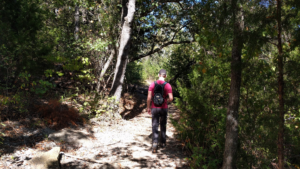 by Jerri Lipple
by Jerri Lipple
When most naturalists think of nature preserves and conservation, they think about the native habitats and animals they are saving. Wild plants and animals, however, are not the only ones who benefit. Spending time in nature has very real, measurable effects on human physiology. Fifteen minutes is all it takes.
According to a Japanese study conducted by Yoshifumi Miyazaki at Chiba University, physiological changes were seen after a walk in nature as short as fifteen minutes. In the study, eighty-four subjects walked through the woods for fifteen minutes and another eighty-four subjects walked through an urban environment for fifteen minutes. Subjects who walked through woods reduced their levels of cortisol (a stress hormone) by sixteen percent, blood pressure by two percent and heart rate by four percent. Subjects walking in an urban environment did not experience these positive changes.
In another study conducted by Greg Bratman at Stanford, subjects were split into two groups. One group walked in a grassland area with oak trees for 90 minutes while the other group walked down a busy, four lane street for 90 minutes. Brain scans were conducted on the volunteers before and after the walk. The group that walked through the grasslands with trees had reduced activity in the subgenual prefrontal cortex, the area of the brain that is responsible for depressive rumination. Depressive rumination is repetitive thought focused on negative emotions, on their causes and consequences rather than positive solutions. Reducing activity in this area of the brain can reduce anxiety and sadness while improving concentration and problem solving abilities.
Scientists do not know exactly why nature improves health but studies show that spending time in nature shows measurable improvements in our physiology. So, take a hike! It may not cure all of your problems, but it will make you feel better.
For more information, including additional studies linking improved health to nature, read National Geographic’s article titled: This Is Your Brain on Nature.
Great Places for Nature Walks in North Texas
Arbor Hills Nature Preserve
Bonham State Park
Connemara Conservancy
Eisenhower State Park
Erwin Park
Hagerman Wildlife Refuge
The Heard Natural Science Museum and Wildlife Sanctuary
Lake Tawakoni State Park
Oak Point Park & Nature Preserve
Parkhill Prairie
Sister Grove Park


